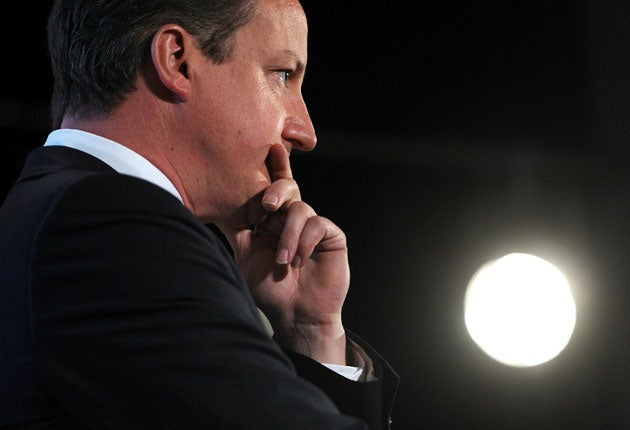Unclaimed savings to fund Tories' Big Society bank plan
Money will be spent on voluntary sector, but charities still fear they will be soft target for cuts

Hundreds of millions of pounds in unclaimed savings will be used to fund voluntary work and charity projects through a "Big Society Bank" scheme to be outlined by David Cameron tomorrow.
The Prime Minister will detail plans to raid bank accounts that have been "dormant" for up to 15 years and redistribute the money to fund enterprises that would otherwise struggle to secure funding amid the Government's austerity programme.
The money – which is expected to total £300m-£400m – will be deposited in a "wholesale bank" that will be tasked with processing funding requests and handing out grants.
Mr Cameron will give details of the scheme in a keynote speech designed to demonstrate that the "Big Society", the central message of his election manifesto, has not perished now his party is in government.
The announcement comes on the eve of Mr Cameron's visit to President Obama in Washington, when he is expected to adopt an emollient tone amid the tensions surrounding BP.
Mr Cameron will stress the importance of the "special relationship" – while accepting that the British are "the junior partner" in the alliance. However, in a blunt rejection of what he regards as Tony Blair's slavish subservience to President Bush, the Prime Minister told Time magazine: "I think that we should deal with things as they are rather than trying to be too needy."
He added: "[Britain] needs a realism about who we are, what we can achieve and what we need to do. Less grand diplomatic talk, a sort of gritty, commercial, business-like realism to British foreign policy."
The two leaders are expected to tackle concerns over BP, including allegations that the company argued for the release of the Lockerbie bomber. They are also due to discuss the progress of the war in Afghanistan, potential action against Iran and the economic situation.
But back home, the economic situation has sparked renewed concerns, with campaigners cautioning that charities must not be a "soft target" for spending cuts, as the Treasury began examining detailed proposals for slashing up to 40 per cent from some Whitehall budgets.
The Labour leadership contender Ed Miliband complained that Labour had already earmarked the millions in dormant bank accounts to pay for facilities for children and young people. He warned that the Big Society bank plan would see the money spread more thinly over a wider range of areas.
Mr Miliband, who helped to create the legislation allowing governments to raid dormant accounts, said: "Labour laid down in law that money from dormant bank accounts must be spent on facilities for young people.
"If the Government downgrades that commitment, people will conclude that its claims to care about improving the life chances of young people are hollow."
Mr Cameron championed the bank concept as an "incredibly ambitious" element of his manifesto during the election campaign. He said the institutions would "strengthen and support social enterprises to help deliver our public service reforms" and "provide new finance for neighbourhood groups, charities, social enterprises and other non-governmental bodies".
He added: "This will provide social enterprises with the start-up funding and support they need to bid for government contracts or work towards delivering services under a payment-by-results model."
The bank will be open for business by the start of next year, and the first grants will be available from April.
However, despite the planned influx of cash, the National Council for Voluntary Organisations (NCVO) yesterday raised fears that its members will be hit particularly hard by the Government's efforts to cut the UK's record £149bn deficit.
Mr Cameron has championed the work of charities – insisting last week they should be known as the "first", not the third sector – and has pledged to give them more chances to take on state roles.
But, with funding for local government expected to be hit, it is feared that town halls will look first at grants for charities as they look for areas to contract operations.
Around a third of charity money comes from government, and campaigners have warned politicians not to ignore the direct impact cuts could have on the lives of vulnerable people.
Karl Wilding, of the NCVO, said: "All that we ask is that governments cut with care, they cut with the knowledge of what the impact of those cuts is going to be.
"Voluntary organisations read the newspapers and they are expecting cuts in the region of 25-30 per cent, though our concern is that sometimes those voluntary organisations will be a soft target and they will experience bigger cuts than perhaps elsewhere."
Join our commenting forum
Join thought-provoking conversations, follow other Independent readers and see their replies
Comments